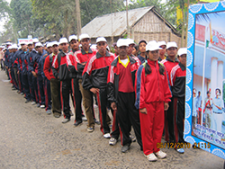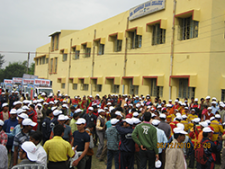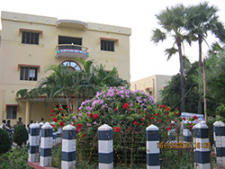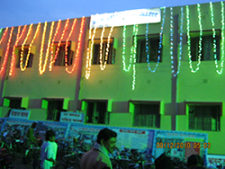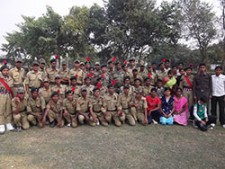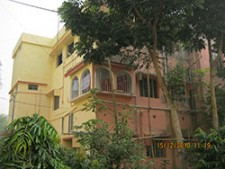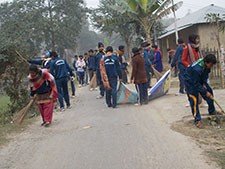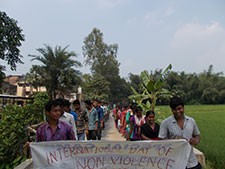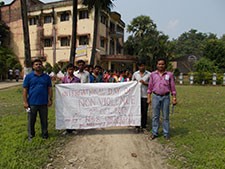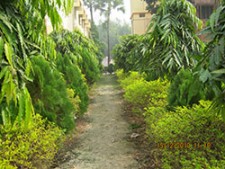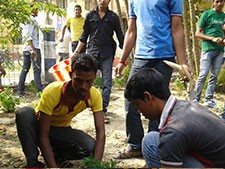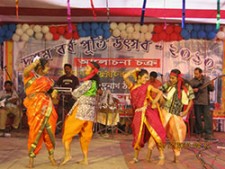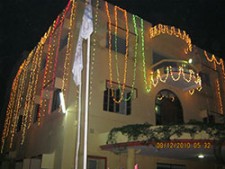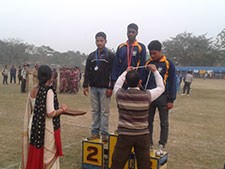English
- Introduction
- Curriculum
- Teaching Learning
- Learning Resources
- E-Learning initiatives
- Seminar, Conferences, Webinar and Workshops
- Notices & Events
- Contact Information
History of the Department
The Department of English started its journey in 2003 by introducing General course. It obtained the approval for introducing Honours course in English in 2006. Besides students’ interest in opting for Honours courses in Bengali and Geography, there has been a huge demand amongst students for choosing English as Honours subject. At present, there are 102 sanctioned seats for three yearHonours courses. The faculty of the department consists of two full time teachers and four SACTs (State Aided College Teacher). Many students have graduated from the Department of English as Honours and General candidates and placed themselves in higher studies. Moreover, many students of the department have established themselves in various sectors, especially as accomplished teachers in various H.S. schools and degree colleges. They have been in touch with the department as alumni. Besides teaching, the department regularly organizes various co-curricular activities like seminars, debates, and group discussions. These activities help the students to prepare for the higher studies as well as for their future placement in the competitive job markets. The students are also encouraged to nurture their creativities through the departmental Wall Magazine and teachers guide them properly in this regard. Above all, the faculty members are always ready to render all possible assistance and guidance to students inside and outside the campus as and when required.
Vision and Mission
- The Department of English is one of the oldest departments of Dr. MeghnadSaha College.
- The undergraduate programme in English has been designed to provide students with a strong foundation in English Literature. Covering a wide range of texts, authors, movements, literary trends, theories and schools of criticism, the course equips students for further study and research in the subject.
- It is also intended to be proactive and to make the study of literature exciting and challenging. Students are encouraged to participate in the teaching-learning process to develop their skills for original, independent and analytical thinking and appreciation.
- As the college is situated in a rural area and most of the students live in various villages surrounding the college, the department has catered to the needs of these rural students. Besides these, various experimental teaching methods have been incorporated within the teaching-learning mechanism to develop the literary understanding of these rural students towards English studies.
- Strategies of teaching include the lecture method, audio-visual techniques, student seminars and class discussions.
Honours Program
Objectives of Honours Program
- Appreciating literature and the significance of humanities in general and literature in particular in human life as well as education.
- The course helps build and improve critical thinking skills. Analysing situations, learning to find symbols, make connections, find themes, learn about characters lead to a capability to look with a larger sense of detail and depth and realize the importance of hidden meanings. This is turn increases the critical thinking skills of the students. Students will demonstrate the ability to think critically about the ways in which various aspects of identity, subject positions, and affiliations—including but not limited to race, gender, class, and sexuality—inform the development of national, transnational, and international literary traditions.
- All literature, whether it be poems, essays, novels, or short stories, helps us address human nature and conditions which affect all people. Thus, it leads to an understanding of humanity.
- Literary works often ask students to think in complex ways, to hold sometimes contradictory, or apparently conflicting ideas in their minds. This kind of processing helps the students to be more mentally flexible and agile—open to new ideas.
- Students are taught English communication which is required for jobs in public sphere as well as private sector jobs. Government jobs compulsorily require a felicity in English language, while private sector jobs too put emphasis on the literacy of the employees in the English language. Through studying the course, particularly through the writing practice the course entails through its assignments and projects and answers, the students gain a mastery over the language which they may use while looking for a job.
Syllabus for the Honours Program
For 1+1+1 system students – https://www.drmscollege.ac.in/wp-content/uploads/2016/08/English-Hons-General.pdf
For CBCS system students- https://www.drmscollege.ac.in/wp-content/uploads/2019/06/ENGLISH-HONOURS-1.pdf
Course Outcome for 1+1+1 students
Paper 1
Unit 1- This unit shall give a detailed foray into the History of English Literature of the Old and the Middle English period. The focus shall be on social, political, cultural and intellectual movements that affected, shaped and influenced the literature of the age.
Unit 2- Students shall learn many of the technical literary terms related to study of literature.
Unit 3- Students shall learn the phonetics of English Language.
Unit 4- Students shall learn about Old English poetry through the poems.
Unit 5- Students shall learn about Middle English poetry through the poems.
Unit 6- The student shall get an insight into later Middle English and morality play through the poems prescribed in the syllabus.
Paper 2
Unit 1- This unit shall give a detailed foray into the History of English Literature of the Elizabethan, Jacobean and Caroline Periods. The focus shall be on social, political, cultural and intellectual movements that affected, shaped and influenced the literature of the age.
Unit 2- Students shall get a deep knowledge about the various factors and influences which have shaped the English language, which includes the vocabulary, syntax structure, pronunciation etc.
Unit 3- Students shall learn about Elizabethan poetry through the prescribed poems.
Unit 4- Students shall learn about Metaphysical poetry through the prescribed poems.
Unit 5- Students shall gain a deep knowledge of Elizabethan comedy through the plays prescribed.
Unit 6- Students shall gain a deep knowledge of Elizabethan tragedy through the plays prescribed.
Paper 3
Unit 1- This unit shall give a detailed foray into the History of Restoration Period and the Eighteenth Century. The focus shall be on social, political, cultural and intellectual movements that affected, shaped and influenced the literature of the age.
Unit 2- The students shall learn the art of effective or persuasive speaking or writing, especially the exploitation of figures of speech and other compositional techniques. They shall also know the patterns of rhythm and sound used in poetry.
Unit 3- The unit shall strive to introduce the students to the birth of modern English epic poetry, through the epics of John Milton.
Unit 4- In this unit, the students shall learn another genre popular during the Restoration Age and the Neo-classical Age- the mock-heroic poem. They shall also get an introduction to the various types of burlesques and the social compulsions that led to their rise.
Unit 5- This unit shall make the students aware to the rise of the most significant genre of the modern age- the novel. Prior to this, novels were almost non-existent, but after the eighteenth century, it has become the most dominant literary genre.
Unit 6- This unit gives an insight into the sentimental comedy and anti-sentimental comedy, which were in vogue during the middle and later eighteenth-century dramatic scene.
Paper 4
Unit 1- This unit shall give a detailed foray into the History of the Romantic Age. The focus shall be on social, political, cultural and intellectual movements that affected, shaped and influenced the literature of the age.
Unit 2- This unit shall enable the students to read closely to determine what the text says explicitly and to make logical inferences from it; cite specific textual evidence when writing or speaking to support conclusions drawn from the text.
Unit 3- An analysis of the early Romantic poems through the poems of Blake, Wordsworth and Coleridge.
Unit 4- An analysis of the later Romantic poems through the poems of Shelley, Keats and Byron.
Unit 5- This unit shall introduce the students to the prose literature of the Romantic Age- with special reference to the essays published during that age.
Unit 6- This unit shall equip the students with the development of the novel genre through the Romantic Age.
Paper 5
Unit 1- This unit shall give a detailed foray into the History of the Victorian Age. The focus shall be on social, political, cultural and intellectual movements that affected, shaped and influenced the literature of the age. Unit 2- This unit shall test the students’ critical faculty as well as writing prowess and command over the language. Unit 3- An analysis of the early Victorian poems through the poems of Tennyson, Browning and Arnold. Unit 4- An analysis and understanding of the later Victorian poets through the poems of Rossetti, Meynell and Hardy. Unit 5- To acquire an understanding of early Victorian novels. Unit 6- To acquire an understanding of later Victorian novels.
Paper 6
Unit 1- This unit shall give a detailed foray into the History of the Modern Age. The focus shall be on social, political, cultural and intellectual movements that affected, shaped and influenced the literature of the age. Unit 2- Students shall learn many of the technical literary terms related to study of literature. Unit 3- To acquire an understanding and a perception into what constitutes modern poetry, through the poems of the major poets of the age. Unit 4- The acquisition of technical and thematic knowledge of modern novels through the novel prescribed. Unit 5- The acquisition of technical and thematic knowledge of modern drama through the drama prescribed. Unit 6- The acquisition of technical and thematic knowledge of modern short story through the short stories prescribed.
Paper 7
Unit 1- To get a better comprehension of literary, societal, cultural, biographical and historical background of the greatest writings in American Literature, and to learn the literary, societal, cultural, biographical and historical background of the greatest English writings penned by Indian Authors. Unit 2- To introduce the students to American poetry through the poems prescribed. Unit 3- To introduce the students to Indian poetry through the poems prescribed. Unit 4- To introduce the students to American drama through the drama prescribed. Unit 5- To introduce the students to Indian drama through the drama prescribed. Unit 6- To introduce the students to American novel through the novel prescribed. Unit 7- To introduce the students to Indian novel through the novel prescribed.
Paper 8
A. ANCIENT EUROPEAN LITERATURE IN TRANSLATION To learn the literary, societal, cultural, biographical and historical background of the Ancient Age, with special reference to the Greek and Roman Age. This shall be done through the study of significant texts of the Greek and Roman literature.
B. INDIAN LITERATURE IN ENGLISH To learn the literary, societal, cultural, biographical and historical background of the greatest English writings penned by Indian Authors and to know the basic principles in translation, issues faced by translators and the popularity gained through target language.
C. AMERICAN LITERATURE To get a deep insight into the literary, societal, cultural, biographical and historical background of American literature and a comprehensive analysis of the greatest writings in American Literature
D. POST WORLD WAR II BRITISH LITERATURE To educate the students about the myriad changes taking place within British Literature during and after the second world war with new social, political, cultural and economic transformations Britain was going through.
E. ENGLISH LANGUAGE TEACHING To gain an understanding about the phonetic, syntactic structures governing English language, a demonstrable ability to use the terms, categories, and concepts of critical or “close” reading. A student should gain the ability to read, understand, analyze, interpret, and extrapolate from the complex texts that are at the heart of the diverse traditions of the English language. Students would also know the various theories related to teaching of English Language to learners whose mother tongue is not English.
Course Outcome for CBCS students
Paper 1 This paper shall give a detailed foray into the English Literature of the Old and the Middle English period to the 17th century with emphasis on poetry and drama of the period. The focus shall be on social, political, cultural and intellectual movements that affected, shaped and influenced the literature of the age through the poems and plays prescribed in the syllabus.
Paper 2 This paper shall give a detailed foray into the English Literature of the 17th and 18th century with emphasis on poetry and drama of the period. The focus shall be on social, political, cultural and intellectual movements that affected, shaped and influenced the literature of the age through the poems and plays prescribed in the syllabus.
Paper 3 This paper shall give a detailed foray into the English Literature of the 18th century. The focus shall be on social, political, cultural and intellectual movements that affected, shaped and influenced the literature of the age through the poems, play and novels prescribed in the syllabus.
Paper 4 This paper shall introduce the students to the Romantic movement in the English Literature. The focus shall be on social, political, cultural and intellectual movements that affected, shaped and influenced the literature of the age through the poems prescribed in the syllabus.
Paper 5 This paper shall give a detailed foray into the English Literature of the 19th century. The focus shall be on social, political, cultural and intellectual movements that affected, shaped and influenced the literature of the age through the poems and novels prescribed in the syllabus.
Paper 6 This paper shall give a detailed foray into the English Literature of the Modern Age. The focus shall be on social, political, cultural and intellectual movements that affected, shaped and influenced the literature of the age through the poems and novels prescribed in the syllabus.
Paper 7 To learn the literary, societal, cultural, biographical and historical background of the Ancient Age, with special reference to the Greek and Roman Age. This shall be done through the study of significant texts of the Greek and Roman literature.
Paper 8 This paper shall introduce the students to ancient Indian texts translated into English.
Paper 9 This paper shall help the students to get a deep insight into the literary, societal, cultural, biographical and historical background of American literature and a comprehensive analysis of the greatest writings in American Literature.
Paper 10 This paper shall introduce to the students some of the greatest plays written in Europe in the twentieth century and therefore realise the movements that were ccurring throughout Europe and not limited merely to the British literature.
Paper 11 This paper shall help students possess a coherent knowledge and a critical understanding of postcolonial literature and its key historical, cultural and theoretical developments; make them able to compare, discuss and explain interconnections and functions of postcolonial literature and its contexts, including comparative and interdisciplinary issues and make them able to critically evaluate arguments and assumptions about postcolonial literature, texts, and modes of interpretation.
Paper 12 To learn the literary, societal, cultural, biographical and historical background of the greatest English writings penned by Indian Authors and to know the basic principles in translation, issues faced by translators and the popularity gained through target language.
Paper 13 Studies of Popular Literature along with the classics shall help the students in gaining a fresh perspective of literature.
Paper 14 The students shall learn about the formal features of women’s writing, including the ways women adopt, adapt, and challenge broader literary traditions. The paper explores the conditions under which women wrote and published as well as how their works were received by their first readers. It provides opportunities to explore key issues and debates in contemporary scholarship on women’s writing and what constitutes “women’s writing” and the effects (both positive and negative) of categorizing literary works in this way.
DSE- Paper 1 To gain an understanding about the phonetic, syntactic structures governing English language, a demonstrable ability to use the terms, categories, and concepts of critical or “close” reading. A student should gain the ability to read, understand, analyze, interpret, and extrapolate from the complex texts that are at the heart of the diverse traditions of the English language. Students would also know the various theories related to teaching of English Language to learners whose mother tongue is not English.
DSE Paper 2 To educate the students about the myriad changes taking place within British Literature during and after the second world war with new social, political, cultural and economic transformations Britain was going through.
DSE Paper 3 The students shall learn of various literary theories pertaining to literary criticism and theory which helps in gaining a fresh perspective to the study of literature.
DSE Paper 4 This course explores the genre of detective fiction from its origins in the nineteenth century to the present day. Course content and time periods may vary by semester. Students learn literary elements of detective fiction, examine the development of the detective as a literary figure and detective fiction as a genre, and analyze depictions of the law and legal system.
DSE Paper 5 This course shall explore the rich literature of the Indian diaspora.
DSE Paper 6 The Partition is one of the most significant events in the history of India. The psychological, sociological, political impact is tremendous. The course shall introduce the students to the literature of the partition era.
General Program
Objective of General Program
- Appreciating literature and the significance of humanities in general and literature in particular in human life as well as education.
- The course helps build and improve critical thinking skills. Analysing situations, learning to find symbols, make connections, find themes, learn about characters lead to a capability to look with a larger sense of detail and depth and realize the importance of hidden meanings. This is turn increases the critical thinking skills of the students. Students will demonstrate the ability to think critically about the ways in which various aspects of identity, subject positions, and affiliations—including but not limited to race, gender, class, and sexuality—inform the development of national, transnational, and international literary traditions.
- All literature, whether it be poems, essays, novels, or short stories, helps us address human nature and conditions which affect all people. Thus, it leads to an understanding of humanity.
- Literary works often ask students to think in complex ways, to hold sometimes contradictory, or apparently conflicting ideas in their minds. This kind of processing helps the students to be more mentally flexible and agile—open to new ideas.
- Students are taught English communication which is required for jobs in public sphere as well as private sector jobs. Government jobs compulsorily require a felicity in English language, while private sector jobs too put emphasis on the literacy of the employees in the English language. Through studying the course, particularly through the writing practice the course entails through its assignments and projects and answers, the students gain a mastery over the language which they may use while searching for a job.
Syllabus for the General Program
*For 1+1+1 system students –https://www.drmscollege.ac.in/wp-content/uploads/2016/08/English-Hons-General.pdf
* For CBCS system students- https://www.drmscollege.ac.in/wp-content/uploads/2019/06/ENGLISH-GENERAL-1.pdf
Course Outcome Outcome For 1+1+1 students
Paper 1 This paper shall give a detailed foray into the History of \ English Literature from the Elizabethan Age to the Modern age. The focus shall be on social, political, cultural and intellectual movements that affected, shaped and influenced the literature of the age.
Paper 2
Unit 1- An analysis of the Elizabethan, Restoration and the early Romantic poems through the poems of Spenser, Shakespeare, Donne, Milton and Blake. Unit 2- An analysis of the Romantic poems through the poems of Wordsworth, Coleridge, Shelley, Byron and Keats. Unit 3- This unit shall introduce the students to the prose literature of the Romantic Age and the Victorian Age. Unit 4- This unit shall introduce the students to various stylistic features and criticisms associated with creative writing. Unit 5- This unit shall enable the students to critically appreciate the short story genre. Unit 6- The students shall learn the art of effective or persuasive speaking or writing, especially the exploitation of figures of speech and other compositional techniques. They shall also know the patterns of rhythm and sound used in poetry.
Paper 3
Unit 1- Students shall learn many of the technical literary terms related to study of literature. Unit 2- Students shall be tested on the basic syntactic features of the English language.
Paper 4
Unit 1- Students shall know how to properly prepare notes. Unit 2- Students shall know how to properly prepare journalistic report. Unit 3- Students shall know how to properly prepare advertisements and how to edit an article. Unit 4- Students shall know how to proof read a particular article or document. Unit 5- An analysis of the Victorian poems and American poems through the poems of Tennyson, Browning, Arnold, Whitman and Dickinson. Unit 6- An analysis of the Modern poems through the poems of Eliot, Yeats, Own, Frost and Thomas. Unit 7- An insight into Shakespearean drama. Unit 8- An insight into British drama through the plays of wither Goldsmith or Shaw. Unit 9- An insight into American drama.
Paper 5
Section A- To learn the literary, societal, cultural, biographical and historical background of the greatest English writings penned by Indian Authors Unit 1- To introduce the students to Indian poetry through the poems prescribed. Unit 2- To introduce the students to Indian novel through the novel prescribed. Unit 3- To introduce the students to Indian drama through the drama prescribed. Unit 4- Students shall learn how to properly compose an essay through critical thinking, organization of thoughts and command over language. Unit 5- Students shall learn how to properly create a story through imaginative thinking, organization of thoughts and command over language. Unit 6- Students shall learn how to succinctly summarise a document or article keeping the main meaning intact.
Course Outcome For CBCS students
DC 1 This paper shall give a detailed foray into the History of English Literature.
DC 2 The paper shall deal with the poetry of English Literature from the Elizaethan Age to the modern period. The students shall learn to appreciate and critical appreciate poetry and relate it to social, political, cultural and intellectual movements that affected, shaped and influenced the literature of the age.
DC 3 The paper shall deal with the drama of English Literature from the Elizaethan Age to the modern period. The students shall learn to appreciate and critical appreciate drama and relate it to social, political, cultural and intellectual movements that affected, shaped and influenced the literature of the age.
DC 4 The paper shall deal with the prose of English Literature from the Elizaethan Age to the modern period. The students shall learn to appreciate and critical appreciate fiction and non fiction and relate it to social, political, cultural and intellectual movements that affected, shaped and influenced the literature of the age.
DSE 1 To gain an understanding about the phonetic, syntactic structures governing English language, a demonstrable ability to use the terms, categories, and concepts of critical or “close” reading. A student should gain the ability to read, understand, analyze, interpret, and extrapolate from the complex texts that are at the heart of the diverse traditions of the English language. Students would also know the various theories related to teaching of English Language to learners whose mother tongue is not English.
DSE Paper 2 The students shall learn of various literary theories pertaining to literary criticism and theory which helps in gaining a fresh perspective to the study of literature.
DSE Paper 3 This course explores the genre of detective fiction from its originsin the nineteenth century to the present day. Course content and time periods may vary bysemester. Students learn literary elements of detective fiction, examine the development of the detective as a literary figure and detective fiction as a genre, and analyze depictions of the law and legal system.
DSE Paper 4 The Partition is one of the most significant events in the history of India. The psychological, sociological, political impact is tremendous. The course shall introduce the students to the literature of the partition era.
Faculty Profile
| ANJAN SOME | 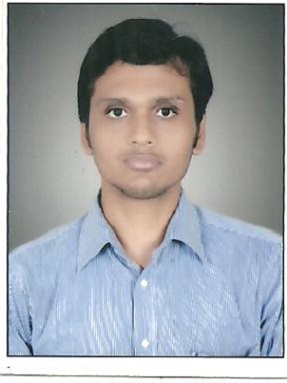 |
| ASSISTANT PROFESSOR | |
| M.A. | |

|
| Sanchayita Paul Chakraborty | 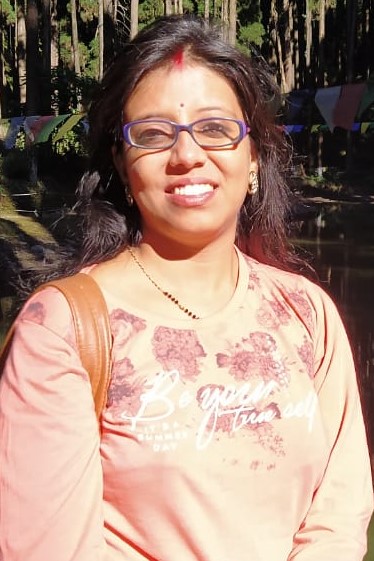 |
| ASSISTANT PROFESSOR & HOD | |
| M.A. in English. | |

|
| DR. FEROJ ALAM |  |
| SACT | |
| M.A., B.Ed. | |

|
| Gopal Sarkar |  |
| SACT | |
| M.A., M.Phil. | |

|
| Chayanika Sarkar | 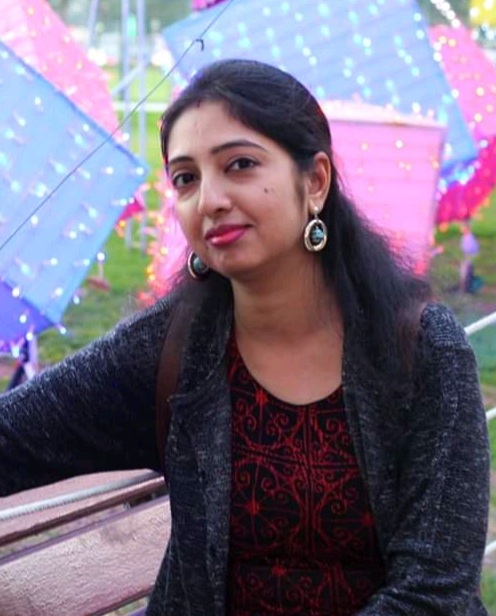 |
| SACT | |
| M.A. in English, B.Ed. | |

|
| Subhamoy Karmakar |  |
| SACT | |
| M.A., B.Ed.& M.Ed. | |

|
Students
Enrollment
Enrollment 2019-20, 1st semester Honours
| Total | Male | Female | SC | ST | OBC-A | OBC-B | General |
| 74 | 45 | 29 | 23 | 04 | 14 | 3 | 30 |
Enrollment 2019-20, Part II Honours
| Total | Male | Female | SC | ST | OBC-A | OBC-B | General |
| 37 | 22 | 15 | 10 | 01 | 10 | 02 | 14 |
Enrollment 2019-20,Part III Honours
| Total | Male | Female | SC | ST | OBC-A | OBC-B | General |
| 52 | 27 | 25 | 12 | 01 | 21 | 04 | 14 |
English General Course
| Section-A | Section-B | Section-C | TOTAL |
| 185 | 185 | 185 | 555 |
Teaching Methods
Internal assessment The Department of English regularly organizes Internal Assessment for the students. This kind of evaluation procedure helps to students to have a deeper knowledge about the subject. Besides this, the internal assessment procedure divides the syllabus in smaller parts and assesses the individual student’s development in the selected part of the syllabus. The continuous process of evaluation also prepares the student for the final examination.
Group Discussion For the complete development of the students both in the curricular as well as co-curricular activities, the Department of English arranges regular group discussion among the students. The students of a particular batch are divided into number of groups. They are encouraged to present their individual opinions and to share it with their group mates. This kind of teaching methodology is a part of a participatory learning process. It also helps the slow learners in better understanding of the subject.
Quiz Quiz is a very important teaching methodology to engage the student with the informative aspect of the subject. As a participant in the quiz, the student is also motivated to study the topic in more details. Keeping in mind the popularity of quiz, the Department of English organizes quiz for each batch of students to make learning more enjoyable as well as engaging for them.
Participatory Learning The Department of English has developed multiple methods of participatory learning for the students. The department organizes regular group discussion among the students to encourage them to develop their individual opinion about the curricular as well as co-curricular topics. Besides this, the Department arranges for Central Library visits for the students, so that the students can develop the habit of participatory learning by using the library resources. Departmental Exhibition is also organized by the department at regular intervals where the students participate t make various models, charts, posters etc. to represent a particular topic from their syllabus. It would help them to understand the subject in a more interactive way.
Strategies for slow learners Participatory learning is very useful for the slow learners. They are incorporated into the various study groups in which the advanced learners engage with them and help them to understand the topic. Besides the regular internal assessment, remedial classes are also arranged by the Department of English for the slow learners where they are encouraged to clear their doubts about the curriculum.
The Department of English believes in participative learning and experiential learning. The classroom is completely ICT enabled for the benefit of the students, so that proper teaching-learning environment is created. The audio-visual mode of teaching is quite famous among the students.The Central Library is equipped with substantial number of books for the benefit of the students. The quality and quantity of books is updated periodically keeping in view the requirements of the students. Other than this, the department also provides to its students a departmental library where a small but useful number of books are kept.
Students are provided notes on a dedicated portal from where they can access the study materials as per their needs. The portal is very interactive and student friendly where students can post their queries and the teachers duly attend to their queries.The teachers have regular access to the N-LIST, so they can be updated with recent researches, International and National level journals and reputed books. By acquiring knowledge via N-LIST they impart that to the students. The students can also access the e-resources from the library During the pandemic, the department conducts regular classes on Google Meet. Owing to the closure of the college necessitated by the Coronavirus pandemic, the students were facing a lot of difficulty in getting quality education due to the stoppage in normal teaching-learning process. The resumption of the classes through Google Meet has filled the void to a great extent.
2019-2020
International Webinar on ‘One Day International Webinar on Women in Pandemic: Past and Present
- Date: 30 June, 2020.
- Resource Persons:
Professor Pinaki Roy, HOD, Department of English Raiganj University Raiganj, West Bengal, India.
Dr. IndraniKarmakar, Andrew Mellon Postdoctoral Fellow, Department of Literary Studies in English, Rhodes University Grahamstown, Eastern Cape, South Africa
Professor Judith AdakuMgbemena HOD, Department of English and Literary Studies Federal University Wukari Wukari, Nigeria.
- Number of Participants: 445
- Webinar Outcome:
Women have been heavily affected by the pandemic, both in the past as well as in the present. As pandemic implies a widespread of disease, it necessitates healthcare and personal protection. Women have been normatively associated with the idea of care, therefore, the additional responsibility during the onslaught of pandemic relies on the shoulder of women. Prof. Judith AdakuMgbemena discussed how the notion of isolation and quarantine to contain spread of pandemic also bears its brunt on the everyday existence of Nigerian women. Working women are thrust into the dual management of home and workplace with a more strenuous schedule. Mothers are burdened with the added responsibility of mothering tinged with a cautious care of her offspring. Dr. IndraniKarmakar talked about how the mind and body of the woman have undergone a tremendous pressure of performance of social, cultural and domestic duties to preserve the people in the time of disease. Prof. Pinaki Roy gave an overall understanding of the effect of pandemic on women’s lives. Many students of the department as well as the students outside the college virtually participated in the webinar. In general, this International Webinar has discussed the condition of women during the pandemic, both in past and present and how it is represented in the literature.
Departmental Exhibition
- Topic: ‘William Shakespeare’
- Date: 9-10 January, 2020.
- Number of Participants: 50.
- Exhibition Outcome: The exhibition was organised by the students of the Department of English with the help of the faculties of the department. The students have made a model of the Globe Theatre and various posters regarding the tragedies and comedies of William Shakespeare. The exhibition has given an interactive space to the students to understand the Age of William Shakespeare, his life and works through participatory learning.
2018-2019
Special Lecture on ‘A Special Lecture on ‘The Nature of Linguistics and Its Approaches in Literary Studies’
- Date: 16 January, 2018.
- Resource Person:
Dr. MandanaKolahdouzMohamadi Linguist, Editor, Translator and Lecturer Payame Noor University Tehran, Iran.
- Number of Participants: 60.
- Outcome of the Special Lecture:
The Special Lecture was delivered by Dr. MandanaKoladouzMohamadi, noted linguist and Lecturer of Payame Noor University on ‘The Nature of Linguistics and Its Approaches in Literary Studies’. The Special Lecture was organized by the Department of English, Dr. MeghnadSaha College. The lecture engages with the relationship between linguistics and literature and how the study of linguistics enables us to have a nuanced understanding of literature. The students and the teachers of Dr. MeghnadSaha College participated in this event.
2017-2018
Departmental Exhibition
- Topic: ‘The Elizabethan Age’
- Date: 13 January, 2018.
- Number of Participants: 60.
- Exhibition Outcome: The exhibition was organised by the students of the Department of English with the help of the faculties of the department. The students created various models, charts and posters to represent the Elizabethan Age in the history of English literature. The exhibition was the part of the teaching-learning methodology as it enabled the students to learn through participatory activities.
ENGLISH NOTICE DATE-2020.03.08
ENGLISH NOTICE DATE-2020.03.05
ENGLISH NOTICE DATE-2020.02.07
ENGLISH NOTICE DATE-2020.01.25 (2)
ENGLISH NOTICE DATE-2020.01.25
ENGLISH NOTICE DATE-2020.01.15
ENGLISH NOTICE DATE-2020.01.07
ENGLISH NOTICE DATE-2019.12.23 (3)
ENGLISH NOTICE DATE-2019.12.23 (2)
ENGLISH NOTICE DATE-2019.12.23
ENGLISH NOTICE DATE-2019.12.14 (2)
ENGLISH NOTICE DATE-2019.12.14
ENGLISH NOTICE DATE-2019.12.12
ENGLISH NOTICE DATE-2019.12.05 (2)
ENGLISH NOTICE DATE-2019.12.05
ENGLISH NOTICE DATE-2019.11.29
ENGLISH NOTICE DATE-2019.11.23
ENGLISH NOTICE DATE-2019.11.22
ENGLISH NOTICE DATE-2019.11.19 (2)
ENGLISH NOTICE DATE-2019.11.19
ENGLISH NOTICE DATE-2019.11.11
ENGLISH NOTICE DATE-2019.11.04 (2)
ENGLISH NOTICE DATE-2019.11.04
ENGLISH NOTICE DATE-2019.07.24
ENGLISH NOTICE DATE-2019.07.10
ENGLISH NOTICE DATE-2019.03.06
ENGLISH NOTICE DATE-2019.02.25 (3)
ENGLISH NOTICE DATE-2019.02.25 (2)
ENGLISH NOTICE DATE-2019.02.25
ENGLISH NOTICE DATE-2019.02.18 (3)
ENGLISH NOTICE DATE-2019.02.18 (2)
ENGLISH NOTICE DATE-2019.02.18
ENGLISH NOTICE DATE-2019.02.14
ENGLISH NOTICE DATE-2019.02.11
ENGLISH NOTICE DATE-2019.01.16
ENGLISH NOTICE DATE-2019.01.10
ENGLISH NOTICE DATE-2019.01.02 (3)
ENGLISH NOTICE DATE-2019.01.02 (2)
Email: drmsc.engdept@gmail.com
WhatsApp Group Link
Semester-1: CLICK HERE
Semester-2: CLICK HERE
Part-2: CLICK HERE
Facebook Page: CLICK HERE


